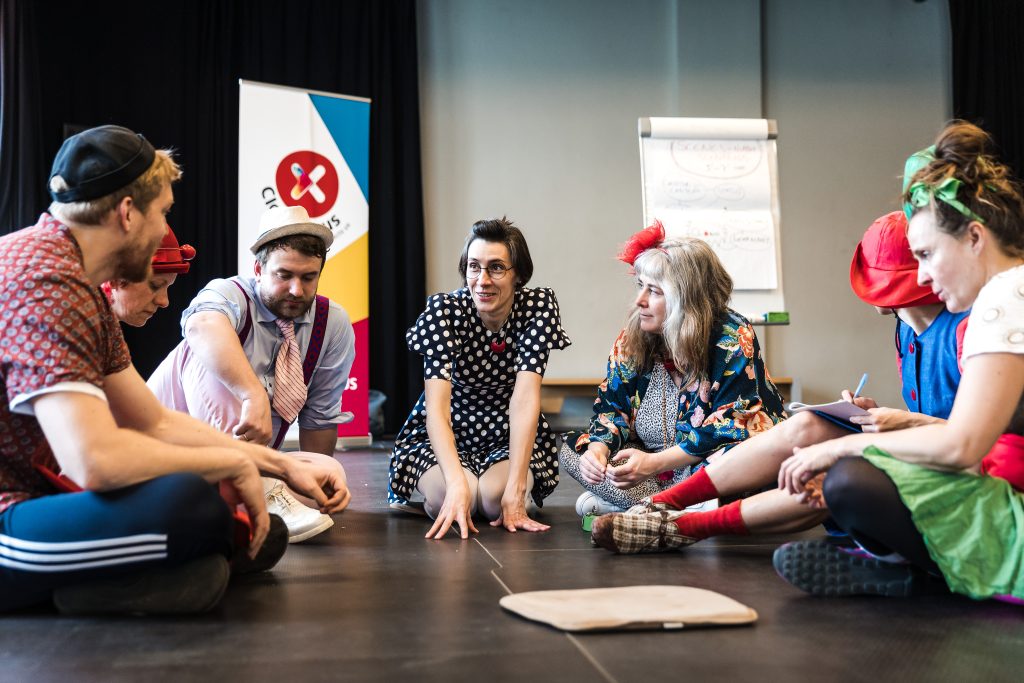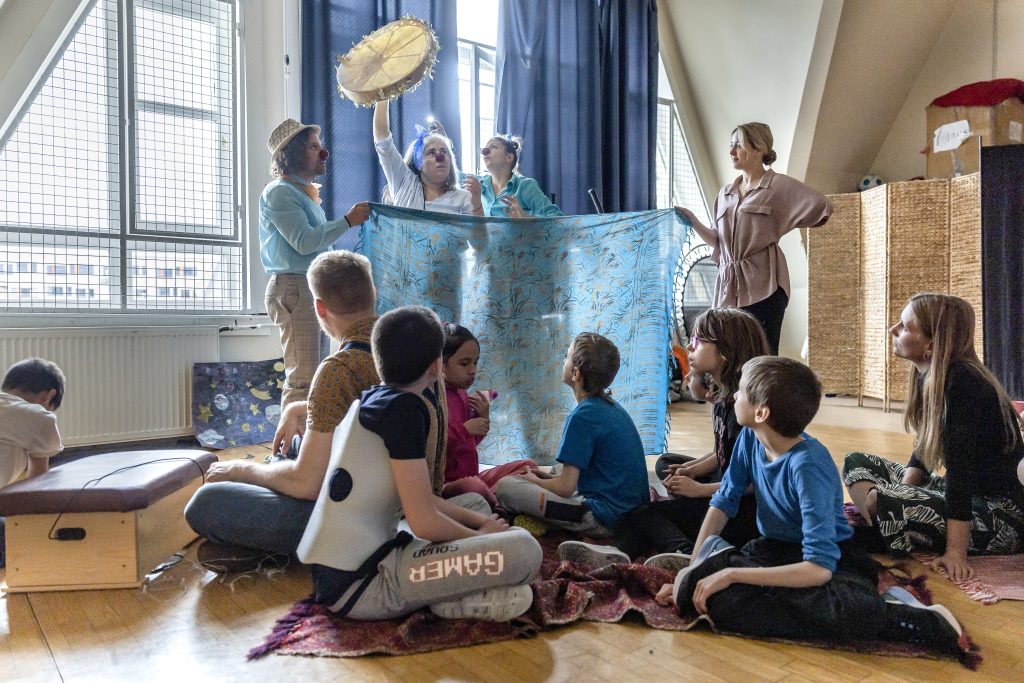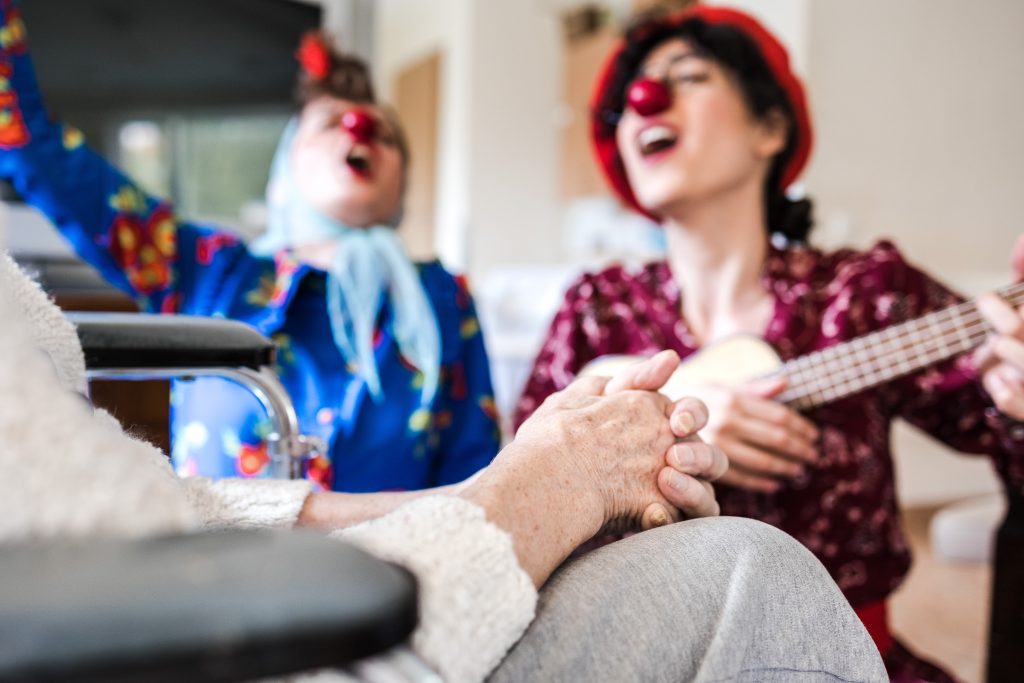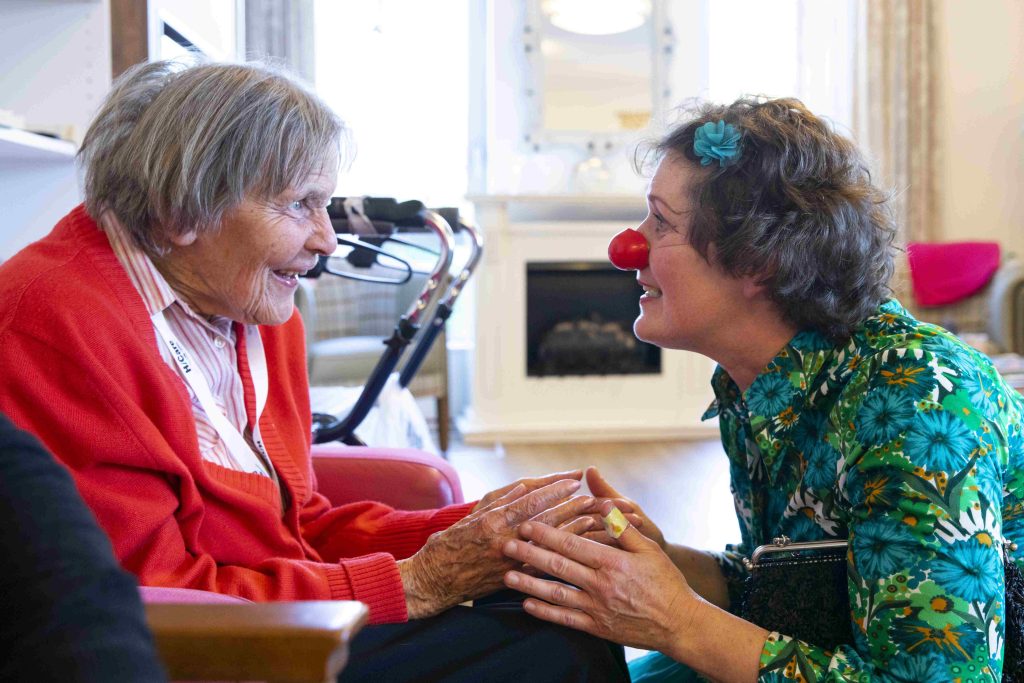© Saulius Aliukonis

Healthcare clowns contribute to the empowerment and mental well-being of various audiences facing challenging circumstances.
This includes hospitalised children, older people, people with special needs, and people who have been forcibly displaced.
Healthcare Clowns are trained to support, encourage, and connect with audiences by recognising and engaging with their individual needs as well as the collective needs of the community.
Scientific research shows that healthcare clowning has a positive impact on audiences, their families, and their environments. Clown interventions have been shown to increase positive emotions, moods, and perceived quality of life.
Furthermore, clown interventions create moments of both focus and attention, which, in turn, have a positive effect on cognitive function and can provide distraction from health-related struggles, for example.
Moreover, they can decrease negative emotions such as anxiety, distress, anger or agitation.
Another positive impact of healthcare clowning is that the presence of clowns can alleviate pain perception and positively impact the healing process. This can improve participation in medical procedures and shorten hospital stays.
Studies also show that clowns provide an opportunity for social engagement which can help to counteract feelings of loneliness and promote social inclusion.
Clown interventions can significantly increase playfulness, self-competence, and create hope for the future.
Healthcare clowns can also improve the cooperation between patients and medical staff, care home residents and care staff, or between aid workers and forcibly displaced people.
Many staff members enjoy the clowns as their presence can improve their mood or reduce their work-related stress.
The presence of humorous interventions in the workplace provides medical staff with a new tool to engage with those they work to support. The presence of healthcare clowns can therefore help to create more supportive environments for everybody in health and care systems.
© Koncz Màrton

However, as clowning is a very novel intervention for children with autism, studies investigating the impact of healthcare clowning on children with autism are scarce.
One randomised-control trial study from the Chaim Sheba Medical Center in Israel showed that children with autism who attended group sessions with clown interventions talked more, played together more, and smiled more than children who experienced other interventions.
The study also highlighted that children with autism who were visited by the clowns showed less stereotypical behaviours both during and after the clown interventions compared to before.
Research into the impact of other art-based interventions, including formats which are equally used by healthcare clowns during their interventions, yielded the following results:
A study from the Vanderbilt University Medical Center in Nashville, and a recent literature review from the Montclaire State University, New Jersey, USA show that theatre techniques are a promising means to improve play behaviour, social communication, and social engagement, in children and youth with ASD.
Furthermore, engaging in theatre-based interventions helps to decrease their self-reported anxiety.
The novelty of conducting clowning interventions for children with ASD calls for more research to investigate its impact and to determine how to best tailor the interventions to the children’s needs.
© Saulius Aliukonis

Healthcare clowning is primarily associated with children and less frequently with providing interventions for older people, or people with dementia.
Previous research studies, however, suggest that healthcare clowning can provide support and have a positive impact on people with dementia and older people in general.
Healthcare clowning can decrease negative emotions, cognitive impairments, and physical pain in older adults. It has also been found to improve overall quality of life.
Scientific research on the impact of healthcare clowning for people with dementia is still in its infancy.
A pilot study conducted in a Canadian nursing home investigated the impact of clowning specifically on older people with dementia.
It showed that two weekly clown visits over the course of 12-weeks to older people with dementia, primarily the Alzheimer’s variation, resulted in a significant reduction of both behavioural and psychological symptoms of dementia, as well as a notable reduction in agitation and distress, and an improved quality of life.
Disruptive behaviours also decreased; however, this did not impact the care staff’s perceived work burden.
Additional ethnographic observations and interviews highlighted that people with dementia were well able to respond and initiate interactions with the clowns.
Research presented different findings regarding the impact of healthcare clowning on agitation among people with dementia. One study reported a decrease in agitation, while another reported that agitation was not affected by clowning interventions.
Healthcare clowning comprises different forms of art and movement. Interventions such as singing and dancing are often used to engage with older people.
Therefore, it may prove interesting to consider research that investigates the impact of similar artistic interventions.
A recent scientific review summarised that music therapy, for example, significantly decreased the behavioural and psychological symptoms of dementia, and that movement-oriented therapy also significantly reduced symptoms.
Another study concluded that people with dementia are at high risk of becoming socially isolated. Art-based interventions can provide them with valuable opportunities to stay socially and culturally connected.
However, in future, we hope that more research on the impact of healthcare clowning or other art-based interventions for people with dementia will support a better understanding of how to best support their needs.
© Stichting Cliniclowns Netherlands

Are you interested in exploring the scientific evidence on the impact of Healthcare Clowning in more detail?
Endline evaluation:
Baseline evaluation:
RED NOSES Research Insights:
RED NOSES Research Database:
Benefits of healthcare clowning for older adults with dementia:
ClowNexus stories from participating carers and artists:
Pia Kontos, Karen‐Lee Miller, Romeo Colobong, Luis I. Palma Lazgare, Malcolm Binns, Lee‐Fay Low, Claire Surr, and Gary Naglie 2016. Elder‐clowning in long‐term dementia care: Results of a pilot study. Journal of the American Geriatrics Society: 64(2): 347-353.
Study on the impact of clowning interventions for children with ASD:
Shahar Shefer, Odelia Leon Attia, Ruth Rosenan, Ori A. Wald, Hamutal Ende, and Lidia V. Gabis 2019. Benefits of medical clowning in the treatment of young children with autism spectrum disorder. European Journal of Pediatrics: 178:1283–1289.